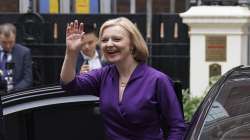Who is Liz Truss, UK's next PM-designate
UK PM RACE: Newly-elected Conservative Party leader and Prime Minister-designate Liz Truss is among the senior British politicians known for championing deeper India-UK strategic and economic ties, describing them as a "sweet spot" of global trade dynamics.

UK Foreign Secretary Liz Truss was on Monday announced the victor of the contest for the Conservative Party leader, defeating former Chancelllor of Exchequer Rishi Sunak, and paving the way for her to become the next Prime Minister. Truss, who succeeds Boris Johnson, will be the third woman Prime Minister of the United Kingdom after Margaret Thatcher and Theresa May, all of from her Conservative Party.
Announcing the results, 1922 Committee chief, Sir Graham Brady said Truss won 81,326 votes, or over 57 per cent, compared to Sunak's 60,399 votes. There was a turnout of 82.6 per cent of the over 170,000 registered party voters, he added. In her brief address on the occasion, Truss thanked the party for "organising one of the longest job interviews in history", as well as her supporters. She praised her rivals, particularly Sunak, saying that the campaign was "hard-fought" and showed "the depth and breadth of talent" in the party.
Who is Liz Truss?
Newly-elected Conservative Party leader and Prime Minister-designate Liz Truss is among the senior British politicians known for championing deeper India-UK strategic and economic ties, describing them as a "sweet spot" of global trade dynamics.
After all, it was Truss as International Trade Secretary who signed off on the India-UK Enhanced Trade Partnership (ETP) for the Boris Johnson-led government in May last year, which marked the starting point of the ongoing free trade agreement (FTA) negotiations.
The 47-year-old senior Cabinet minister made visits to India and held virtual talks with Commerce Minister Piyush Goyal, during which she described the country as a “big, major opportunity”.
As Foreign Secretary, she has been at the forefront of the UK’s response to the Russia-Ukraine conflict, imposing tough sanctions and cracking down on Russian assets in the UK.
While Sunak maintained that tax cuts are not the answer to get a grip on the country's soaring inflation, Truss stood firm on her low tax pledge throughout the campaign – a move that clearly paid off with the historically low tax favouring Conservative Party base.
While UK-born Sunak relied on his personal immigrant story and Indian heritage in a slick campaign run, Truss repeatedly admitted that she may not be the slickest of candidates but had a clear vision of how to “get the job done”.
Ironically, both candidates harked back to Tory grandee Margaret Thatcher as their inspiration.
However, while Sunak belonged firmly to one end of the party wing as a Brexiteer, Truss was someone who had voted for the UK to remain in the European Union (EU). She was also often pulled up about her membership and campaign for the Liberal Democrats as a young Oxford University student.
"The reason I am a Conservative is that I saw kids at my school being let down in Leeds," she said during a television debate early on in the campaign, when confronted with her political flip-flop.
But whatever her background, the MP for South West Norfolk managed to win over the Tory membership base, which had her as a clear frontrunner since she was elected as a finalist by her party colleagues.
Born in Oxford to a maths professor father and nurse teacher mother, Truss grew up and lived in different parts of the UK, including Paisley in Scotland and Leeds, Kidderminster and London in England – something she capitalised on during the campaign as her commitment to all parts of the country if elected leader.
Truss is married to accountant Hugh O'Leary with two teenage daughters.
(With inputs from PTI, IANS)